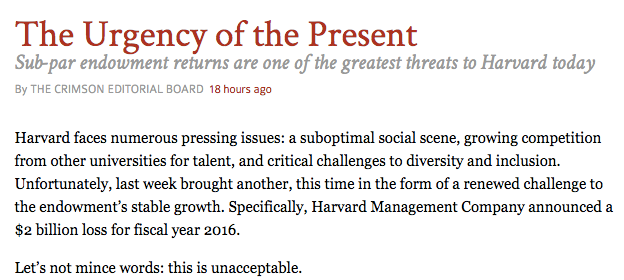This past year, Harvard University’s endowment lost a bit of money, shrinking by almost $2 billion to a mere $35.7 billion. And let me tell you, the editorialists at the school newspaper are absolutely furious. They even wrote a whole article about it. Here’s how it begins.

Screenshot via the Crimson
This is unacceptable, the editor typed, huffily adjusting his top hat and monocle.
Given that Harvard is still the wealthiest institution of higher learning in the country, with an endowment somewhere around 40 percent larger than second place Yale’s, I don’t think a year or even several years of bad returns really qualifies as an existential threat. However, there is a finance story here. Harvard’s endowment fund has in fact been underperforming its peers in recent years. (Real sentence from the Crimson: “In fiscal year 2015, Harvard ranked penultimate among Ivy League institutions, with Princeton besting Harvard Management Company by nearly seven points.” Penultimate!) And that might be leading to a shake-up in strategy at its much vaunted in-house hedge fund—because that’s what it really is—Harvard Management Co. You see, where most schools tend to outsource their money matters to a variety of fund managers, Harvard has a 200-person team of well-compensated investment pros and their staff. But at the moment, HMC is looking for its fourth CEO since 2005, and as Bloomberg has reported, the two leading contenders seem to be of the same find-some-other-smart-Wall-Streeter-to-make-your-money-grow philosophy. So Harvard’s investment approach might be about to get a little more boring and traditional.
Oddly, the Crimson editors don’t mention the new executive search. Instead, they “wish to urge the administration to prioritize endowment performance before Harvard falls further behind peer institutions.” To which I say, tax the brutes.
